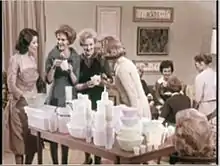Tupperware
Tupperware is an American household products company that develops, manufactures, and internationally distributes preparation, storage, and serving containers for the kitchen and home. It was founded in 1942 by Earl Tupper, who developed his first bell-shaped container and introduced the products to the public in 1946.
| Type | Subsidiary |
|---|---|
| Founded | 1946 in Leominster, Massachusetts |
| Founder | Earl Tupper |
| Products | Preparation, storage, serving products for the kitchen and home, and beauty products |
| Revenue | |
Number of employees | 13,500 (2010)[1] |
| Parent | Tupperware Brands |
| Website | www |
Tupperware is a wholly owned subsidiary of Tupperware Brands. As of 2007, it was sold by approximately 1.9 million direct salespeople on contract.[2] In 2013, the top marketplace for Tupperware was Indonesia, topping Germany. Indonesia's sales in 2013 were more than $200 million.[3]
Company history

.jpg.webp)
Early years
Earl Tupper (1907–1983) asked for pure polyethylene pellets from Dupont to build Tupperware products in 1938.[4] He developed the first product in 1946 in Leominster, Massachusetts.[5] The polyethylene plastic containers could be used in households to contain food and keep them airtight, and featured a "burping seal" that was patented in 1949.[6]
The product became notable with a sale-through-presentation idea, held in a party setting.[7] Tupperware developed a direct marketing strategy known as the party plan to sell products. The party plan called Tupperware party enabled women of the 1950s to earn an income while keeping their focus in the domestic domain.[8] Brownie Wise (1913–1992), a former sales representative of Stanley Home Products, started organizing more of these parties and was soon made vice president of marketing in 1951.[9][10] Later, she created Tupperware Parties Inc.[11]
During the early 1950s Tupperware products gained popularity and sales increased. The company continued the Tupperware parties and rewarded top-selling women.[12][13][14]
1960–2000
Tupperware expanded to Europe in 1960 when Mila Pond hosted Tupperware parties in Weybridge, England, and other locations around the world.[15] A comparison technique called "carrot calling" was used by the representatives wherein they would travel door-to-door in a neighborhood and ask housewives to compare carrots placed in a Tupperware container with anything that they would have ordinarily left them in. These would lead to scheduling of a Tupperware party.[15]
In 1977, Rexall, the owner of the Tupperware brand, sold its namesake drugstores and renamed itself Dart Industries. Dart merged with Kraft Foods to form Dart & Kraft. The company demerged, with the former Dart assets renamed to Premark International. Tupperware Brands was spun off from Premark in 1996.[16]
2001–present
In 2003 Tupperware closed down operations in the UK and Ireland, citing customer dissatisfaction with their direct sales model.[17][18] The company relaunched in the UK in mid-2011,[19] and recruited UK staff, but in December the relaunch was canceled.[20]
As of 2007 Tupperware was sold by means of approximately 1.9 million direct salespeople on contract.[21]
In May 2018, the Israeli daily TheMarker reported that Tupperware will withdraw from Israel leaving 2,000 agents without a job.[22] Tupperware Israel relaunched in December 2020 as an online shop.[23] In March 2021 Tupperware closed down operations in the Netherlands.[24] In August 2022, Tupperware announced it would be leaving the New Zealand market in late 2022.[25]
On November 2, 2022, after publishing quarterly results, the company said its inability to maintain compliance with its credit agreement raises substantial doubt about its ability to continue as a going concern. The stock value dropped more than 40%. In April 2023 the company warned that there is "substantial doubt about the company's ability to continue as a going concern". The stock price dropped almost 50% on the same day.[26] On April 11, 2023, Tupperware's stock value plummeted to $1.30. Although there was a slight recovery the following day, its sliding sales and increasing debt prompt warnings of permanent company closure unless it receives substantial investment.[27]
As of April 2023 Tupperware has 82 countries listed as places they trade.[28] In May 2023, a financially-ailing Tupperware signed on Moelis & Co. to explore various available strategic options, as it also detected inconsistencies in its prior periods' financial reportings.[29]
On 1 June 2023, Tupperware stopped supplying an independent sales force in the UK and Ireland[30][31] and moved fully to selling online and via the shopping TV channel Ideal World, shortly before Ideal World itself went out of business in early July 2023.[32]
Tupperware parties

Tupperware is still sold mostly through a party plan. A Tupperware party is run by a Tupperware consultant as a host or hostess who invites friends and neighbors into their home to see the product line. Parties also take place in workplaces, schools, and other community groups.[33] To stay in touch with its sales force, Tupperware published the monthly magazine Tupperware Sparks. The magazine had snapshots of saleswomen posing with awards and recognition for high sales. To avoid spending money on advertising, Tupperware created events that attracted free publicity.[34]
The multi-level marketing strategy adopted by Tupperware has been criticized as manipulative.[35] Statistics released by Tupperware in 2018 showed that 94% of its active distributors remained on the lowest level of the pyramid, with average gross earnings of $653.[36]
In recent years, Tupperware in North America has moved to a new business model which includes more emphasis on direct marketing channels and eliminated its dependency on authorized distributorships. This transition included selling through Target stores in the US and Superstores in Canada with disappointing results.[37] In countries with a focus on marketing through parties (such as Germany, Australia, and New Zealand), Tupperware's market share and profitability continue to decline.[38] In New Zealand, products can be also purchased online without a salesperson.
In China, Tupperware products are sold through franchised "entrepreneurial shopfronts", of which there were 1,900 in 2005, due to pyramid selling laws enacted in 1998.[39][40]
Gender aspects and cultural influence
The Tupperware parties sales model created opposite views by feminists. The positive feminist considered that Tupperware provided employment for women who were pregnant or otherwise not guaranteed their position at work due to unequal gender laws in the workplace.[8] Opposing views stated that the intended gendered product and selling campaign further domesticates women, and keeps their predominant focus on homemaking.[41] It also includes the restriction of women to the domestic sphere and limiting the real separation between running the household and a career.[8]
See also
- Gold party
- Hana Cobi Plastic aka Lock & Lock
- Newell Rubbermaid
- Tub (container)
References
- "Form 10-K Annual Report Filed Feb 22, 2011 (FY 2010)". Tupperware Inc./SEC Filing. Archived from the original on 2012-07-27.
- "New sales record in 2007, Growth in all regions". www.plasteurope.com. 8 November 2008.
- Cochrane, Joe (March 2015). "Tupperware's Sweet Spot Shifts to Indonesia". The New York Times. Retrieved April 7, 2015.
- "Earl Silas Tupper". www.pbs.org.
- "Earl Silas Tupper". Ideafinder.com. Retrieved 2013-02-28.
- Ananya Bhattacharya (11 April 2023). "Tupperware's business is nowhere near as airtight as its containers". Quartz.
- Tupperware Documentary, retrieved 2022-10-05
- Clarke, Allison J. (1999) Tupperware, Washington: Smithsonian Institution Press. pp. 192–193. ISBN 1560989203.
- Maurer, Elizabeth (2017). "Social Marketing Before the Internet". National Women's History Museum.
- "Secret History Of: Tupperware". The Independent. 2010-10-08. Retrieved 2017-08-12.
- Bax C. (2010). "Entrepreneur Brownie Wise: Selling Tupperware to America's Women in the 1950s". Journal of Women's History. 22 (2): 171–180. doi:10.1353/jowh.0.0159. S2CID 154411167.
- Wortz, Eleanor Thompson. "Fly Gals of World War II". Robertson Publishing. Retrieved September 25, 2011.
- Goudreau, Jenna (February 14, 2011). "The Tupperware Effect, Empowering Women Around The World". Forbes.
- "Empowering the Community at Risk: The Partnership of PT Tupperware Indonesia and HOPE worldwide" (PDF). Public Health Institute. October 2009. Archived from the original (PDF) on 2012-07-11. Retrieved 2012-03-21.
- "What is today's American Dream?". BBC News. 28 March 2011. Retrieved 2011-03-29.
- "Tupperware Spinoff Is Set for May 31". The New York Times. 20 May 1996.
- "Party Is over for Tupperware UK". BBC News. 23 January 2003. Retrieved 10 May 2011.
- "Tupperware". tupperware.co.uk.
- "Did Tupperware Parties Change the Lives of Women?". BBC News. 10 May 2011. Retrieved 10 May 2011.
- "Mike Roberts". LinkedIn. United Kingdom. Retrieved 2013-02-28.
- Cortese, Amy (July 7, 2007). "Tupperware Freshens Up the Party". The New York Times. Retrieved May 19, 2009.
- חרותי-סובר, טלי (2018-05-17). "טאפרוור עוזבת את ישראל - ו-2,000 מפיצות ללא עבודה". TheMarker. Retrieved 2018-05-18.
- "Home". tupperware.co.il.
- "No more 'plastic path to empowerment': Tupperware party in NL is over". March 2021.
- "The famous Kiwi party's over: Tupperware closes lid on NZ operation". NZ Herald. Retrieved 2022-08-24.
- Jordan Valinsky (April 10, 2023). "Tupperware stock plunges after warning it could go out of business". CNN.
- "Tupperware: Why the household name could soon be history". BBC.
- "Tupperware - Where you can find us - Our Story". www.tupperwarebrands.com.
- "Tupperware brings on Moelis & Co to help explore strategic alternatives". reuters.com. 8 May 2023. Retrieved 2023-06-07.
- "What's going on?". Tupperware Man.
- "Tupperware UK | Tupperware Queen UK | Buy Genuine Tupperware Online". Tupperware Queen Shop UK.
- "Ideal World shopping channel goes into administration". BBC News. July 6, 2023.
- Blakemore, Erin (1 March 2019). "Tupperware Parties: Suburban Women's Plastic Path to Empowerment". History.com.
- "Tupperware Home Parties". PBS. Retrieved 29 July 2018.
- Richards, Laura (22 January 2019). "How MLMs — multilevel marketing schemes — are hurting female friendships". Chicago Tribune. Retrieved 30 March 2019.
- "Tupperware Income Disclosure Summary" (PDF). Tupperware. Archived from the original (PDF) on 30 March 2019. Retrieved 30 March 2019.
- "Tupperware to End Partnership with Target Stores". The New York Times. June 19, 2003. Retrieved May 19, 2009.
- Kilgore, Tomi. "Tupperware matches profit views, sales fall slightly less than expected". MarketWatch. Retrieved 2019-04-01.
- Tempest, Rone; Farley, Maggie (April 24, 1998). "China Slams Door on Direct-Sales Firms". Los Angeles Times. Retrieved May 19, 2009.
- "Tupperware adapts to serve diverse markets". Plastics News. November 17, 2005. Archived from the original on December 8, 2008. Retrieved May 19, 2009.
- Vincent, S. (2008). "Preserving Domesticity: Reading Tupperware in Women's Changing Domestic, Social and Economic Roles". Canadian Review of Sociology. 40 (2): 171–196. doi:10.1111/j.1755-618X.2003.tb00242.x.
Further reading
- Tupperware: The Promise of Plastic in 1950s America by Alison Clarke, published by the Smithsonian Institution (September 30, 2014), ISBN 1588344363.
- Charles Duhigg, "Why Short Sellers Want to Crash the Tupperware Party," New York Times, November 17, 2006.
- Elayne Rapping, "Tupperware and Women", Radical America, vol. 14, no. 6 (November–December 1980), pp. 39–49.